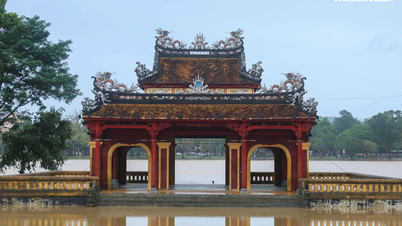(VHQN) - Ancient Confucian scholars used the term "phong sử" to refer to folk songs and rhymes originating from ancient historical events. In phong sử, many rhymes were created to spread stories of the times through children's singing. Over time, the original intention was lost, leaving only simple lyrics or lyrics associated with children's games.

“Chi chi nhến nhến, the tinder blows fire, the horse breaks free, the five emperors remain, they devise a plan to find them. Hide and seek… ap.” Everyone knows this rhyme that sets the rhythm for the childhood game of “hide and seek” (there are variations in both lyrics and games using this nursery rhyme - BT).
Researchers have pointed out that "the fire-breathing nail" refers to the sound of French colonial guns firing at the Da Nang seaport. "The horse with broken reins" refers to King Ham Nghi abandoning his throne and going to the Tan So base in Quang Tri to issue the Can Vuong proclamation against the French.
Therefore, the hypothesis that "the five emperors remained" refers to the upheavals in the Hue court after the death of Emperor Tu Duc: within four months, three emperors, Hiep Hoa, Duc Duc, and Kien Phuc, were enthroned; then Emperor Dong Khanh was enthroned after the French colonialists "plotted to find" and capture Emperor Ham Nghi, sending him into exile in Algeria.
The lyrics, "Heaven and hell on either side, the wise will benefit, the foolish will suffer. Lying in bed at night, I think of God, remembering the Father, reciting prayers to follow the Father of the soul. The soul must protect the soul, until old age and death, to go to heaven," are associated with a game. Two children wrap their arms around each other to form two gates, testing the agility of the other children; the quickest ones slip through the gates of heaven and enjoy happiness, while the slowest must enter the dark gates of hell.

Initially, it was a game created for children in Catholic neighborhoods. Later, its original purpose faded, and it became widespread, with children playing it everywhere. "Heaven and Hell" now only serves as two gateways to test children's enjoyment – they play without understanding the religious message originally intended in the lyrics.
A Vietnamese Confucian scholar in the early 20th century collected 100 folk songs from the Central region and attempted to explain their historical and cultural origins in his book "Vietnamese Folk History" (author: Tieu Cao Nguyen Van Mai - handwritten manuscript in Chinese characters, catalog number VNT19, preserved at the Saigon Institute of Archaeology since 1955; translated by Ta Quang Phat; published by the Saigon Office of the Secretary of State for Culture in 1972). In this collection, there are many very old folk songs whose origins are explained in some places with fairly clear hypotheses, while in others they remain vague and questionable.
“ At dawn, I go down to bathe in the East Sea, trampling on the dragon that rises up in nine bends. I am overjoyed / Dragonflies are in disarray, gold hairpins are in disarray, some fly open the gate, others sneak through. I am overjoyed / Greeting the snake, where is the snake going? Stroking the tiger's beard. I am overjoyed .” These three lines belong to chapters 18, 19, and 20 of the aforementioned book, which author Nguyen Van Mai commented “are all playful songs of buffalo herders, and their meaning is unclear” (ibid., pp. 72-74).
However, he later speculated: "These three chapters mean that when Dinh Tien Hoang was a shepherd, he played with the children, created battle formations to fight the enemy, and made the children sing."
Chapter 18 is like the Dragon Formation, Chapter 19 is like the Butterfly Formation, Chapter 20 is like the Snake Formation, because the tradition has long since disappeared. Now, the shepherds, whenever they herd buffalo in the fields, gather and sing these songs, so I have written them down to ask the gentlemen for their opinions" (ibid., p. 75).
“Oh, Nược Nược! The late moon has risen, the tide is rising. Row across to the riverbank, set out three or five baskets. Perhaps heaven will bless us, and we'll catch a whale fish. Money will fill our baskets, and rice will fill three or five baskets.” This children's rhyme is associated with the game of diving and chasing on the river, and the author of "Vietnamese Historical Records" explains it as an allegorical story about an old fisherman named Tráng who secretly dived across Thị Nại lagoon to deliver a letter from Võ Tánh (who was besieged by the Tây Sơn army in Quy Nhơn city) to Lord Nguyễn Ánh, who was anchored at sea intending to rescue him. Võ Tánh advised the Lord not to rescue him but to take this opportunity to attack Phú Xuân.
Following the advice, Nguyen Anh seized the northern capital of the Tay Son dynasty. This decisive victory laid the foundation for the establishment of the Nguyen dynasty. Later, when summoned by Emperor Gia Long to reward him, the old fisherman asked for nothing, only wishing to enjoy his daily fishing profession.
Recently, a controversy has arisen regarding the legend that the mother and daughter, Phi Yến – concubines of King Gia Long (mother named Răm and daughter named Cải) – are the origin of the children's rhyme "The wind carries the mustard greens to heaven, the coriander remains to endure bitter words."
However, more than 100 years ago (1914 - 1920), author Tieu Cao Nguyen Van Mai stated that this verse was written by a concubine named Nguyen Thi Kim during the late Le Dynasty to express her feelings; it later became a popular children's rhyme.
Source




































































































Comment (0)